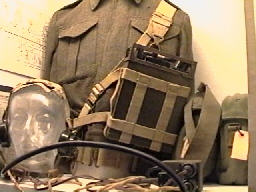Wireless Sets overview part 2
Wireless Set 21
The WS 21 is a low power transmitter-receiver for short range
R/T and CW communications in infantry brigades and Royal
Artillery regiments and is intended to perform similar duties to
the WS 11 LP. A combined sender and receiver in one pressel steel
case controlled by a separate unit which fits into the front of
the set.
| Year of issue |
1940 |
| Purpose |
GP Inf Bde, RA Regt Truck/Ground station |
| Frequency |
4.2 - 7.5 Mhz
19 - 31 Mhz |
| Range (miles) |
CW 8, R/T 5
CW 2, R/T 1 |
| Power output (watt) |
CW 1.5
CW 0.8 |
| Transport |
Truck, pack |
| Remarks |
|
|
 |
Back to index
Wireless Set 22
The WS 22 is a 13 valve medium powered sender/receiver,
similar design and operation to the WS 19, but providing
facilities of the WS 11 HP and stations. The frequency range is
covered in 2 bands.
See also our handcart
wireless, with WS-22
| Year of issue |
1942 |
| Purpose |
GP Bde, Div Truck/ground station |
| Frequency |
2-8 MHz |
| Range (miles) |
CW 15, R/T 10 |
| Power output (watt) |
CW 1.5, R/T 1 |
| Transport |
Truck, man-pack, animal pack |
| Remarks |
|
|
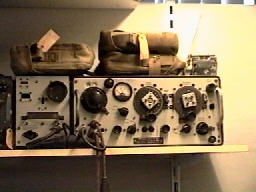 |
Back to index
Wireless Set 22 Australian
As activities escalated in New Guinea in 1942, The Wireless
Sets No.101 and 109 were probably proving unsatisfactory due to
the lack of tropic proofing, excessive weight, lack of
portability, limited frequency range and in the case of the
No.101 insufficient output power. The No.11 (Aust.) was still
undergoing conversion design, but would not meet all of the
requirements, even when in production, due to excessive weight,
lack of portability and limited frequency range. The British
No.22 met all of the requirements, except for adequate tropic
proofing, and in December 1942 the decision was taken to produce
the No.22 (Aust.) based on the British No.22, but was to become
Australia's, and possibly the world's, first fully tropic sealed
set. As an interim, the No.22 Yellow Band was produced by Radio
Corporation in 1943, closely resembling the British No.22, but
using readily available components. Radio Corporation commenced
production of the No.22 (Aust.) in March 1944. Although the No.22
(Aust.) included facilities for incorporating two crystal locked
frequencies, it was not until the production of the No.122
(Aust.) commenced in about mid 1945 that the facility was
incorporated in the updated set. The No.22 (Aust.) and No.122
(Aust.) remained in service until 1952 or 1953 when both sets
were rebuilt in to the No.122 (Aust.) Mk.2 version.
Ranges from 3 to 5 miles in jungle using a 12 ft. vertical aerial
on voice (a.m.), to 60 to 70 miles in open ground using a 1/4
wave wire aerial on morse (c.w.) could be achieved.
Power source, external vibrator power supply requiring a 12 volt
lead-acid battery. Frequency coverage, 2 to 8 Mc/s in two
switched bands. Power output, high power, 3.5 to 4 watts on voice
and m.c.w., 6 to 7 watts on c.w., low power, approximately 25% of
high power. Modes, voice (a.m.) and morse (c.w. and m.c.w.). The
receiver is of a 7 valve superhetrodyne design with an
intermediate frequency (IF) of 455 Kc/s. Total number of valves,
10 shared between the transmitter and the receiver. The output
valve is the ubiquitous 807.
| Year of issue |
1943--44 |
|
| Purpose |
GP Bde, Div Truck/ground station |
|
| Frequency |
2-8 MHz |
|
| Range (miles) |
CW 15, R/T 10 |
|
| Power output (watt) |
CW 1.5, R/T 1 |
|
| Transport |
Truck, man-pack, animal pack |
|
| Remarks |
Australian build |
|
Back to index
Wireless Set 22 Yellow Band
Australian versions of the No.22, using locally available
valves, 807 output, yellow band to identify!. Radio Corp.
| Year of issue |
1943--44 |
|
| Purpose |
GP Bde, Div Truck/ground station |
|
| Frequency |
2-8 MHz |
|
| Range (miles) |
CW , R/T |
|
| Power output (watt) |
CW , R/T |
|
| Transport |
Truck, man-pack, animal pack |
|
| Remarks |
Australian build |
|
Back to index
Wireless Set 23
| Year of issue |
1940 |
|
| Purpose |
Corps and Div long range |
|
| Frequency |
1.2 - 13.55 MHz |
|
| Range (miles) |
CW 1000, R/T 200 |
|
| Power output (watt) |
CW 250 |
|
| Transport |
two 15cwt trucks |
|
| Remarks |
Interim set only, very few made |
|
Back to index
Wireless Set 24
| Year of issue |
1940 |
|
| Purpose |
Intercommunication between tanks |
|
| Frequency |
230 - 255 MHz |
|
| Range (miles) |
R/T 0.6 |
|
| Power output (watt) |
R/T 0.25 |
|
| Transport |
Tanks |
|
| Remarks |
Experimental set, replaced by WS19B |
|
Back to index
Wireless Set 26
| Year of issue |
1940 |
|
| Purpose |
L of C Radio relay |
|
| Frequency |
85 - 100 MHz |
|
| Range (miles) |
R/T 40-60 Optical path |
|
| Power output (watt) |
R/T 65-100 |
|
| Transport |
Two special trucks with trailers |
|
| Remarks |
6 tele circuits over radio link |
|
Back to index
Wireless Set 27
| Year of issue |
1940 |
|
| Purpose |
Infantry man-pack |
|
| Frequency |
22-25 MHz |
|
| Range (miles) |
R/T 2-3 |
|
| Power output (watt) |
R/T 0.25 |
|
| Transport |
Man Pack |
|
| Remarks |
Abandoned |
|
Back to index
Wireless Set 27 Canadian
| Year of issue |
1943 |
|
| Purpose |
Infantry man-pack |
|
| Frequency |
18-26.5 MHz |
|
| Range (miles) |
R/T 1-2 |
|
| Power output (watt) |
R/T 0.3 |
|
| Transport |
Man Pack |
|
| Remarks |
Canadian design |
|
Back to index
Wireless Set 28
Superseded by WS 18.
| Year of issue |
1940 |
| Purpose |
Infantry Coy Battn HQ |
| Frequency |
6-9 MHz |
| Range (miles) |
CW 5-8, R/T3-5 |
| Power output (watt) |
CW 0.25 |
| Transport |
Man pack |
| Remarks |
Alternative to 18set, abandoned |
|
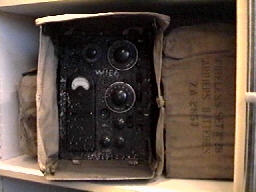 |
Back to index
Wireless Set 29 Canadian
| Year of issue |
1945 |
| Purpose |
GP AFV Truck/ground station |
| Frequency |
2-8 MHz, 235/245 MHz |
| Range (miles) |
CW 40, R/T 25, 0.6 |
| Power output (watt) |
CW 25 (HP), R/T 25, 1 |
| Transport |
AFV, Truck |
| Remarks |
Canadian design, replacing WS19 HP |
|
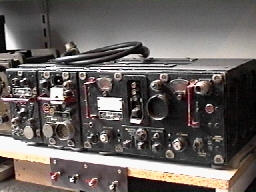 |
Back to index
Wireless Set 31
| Year of issue |
1947 |
|
| Purpose |
Infantry Coy Battn HQ |
|
| Frequency |
40-48 MHz |
|
| Range (miles) |
R/T 3-5 |
|
| Power output (watt) |
R/T 0.3 |
|
| Transport |
Man-pack |
|
| Remarks |
|
|
Back to index
Wireless Set 31 HP
| Year of issue |
195? |
|
| Purpose |
|
|
| Frequency |
40-48 MHz |
|
| Range (miles) |
R/T |
|
| Power output (watt) |
R/T |
|
| Transport |
|
|
| Remarks |
Dutch modification (van der Heem) |
|
Back to index
Wireless Set 31AFV
| Year of issue |
1947 |
|
| Purpose |
Communication between Infantry and Tanks |
|
| Frequency |
40-48 MHz |
|
| Range (miles) |
R/T 3-5 |
|
| Power output (watt) |
R/T 0.3 |
|
| Transport |
AFV, Tanks |
|
| Remarks |
|
|
Back to index
Wireless Set 32
| Year of issue |
1944 |
|
| Purpose |
Experimental AFV, truck & ground station |
|
| Frequency |
2-8 MHz |
|
| Range (miles) |
CW 20, R/T 20-15 |
|
| Power output (watt) |
CW 10, R/T 2.5-10 |
|
| Transport |
AFV or Truck |
|
| Remarks |
Experimental set AM,FM,CW |
|
Back to index
Wireless Set 33
The WS 33 is a medium/high power sender similar in design and
facilities to the WS 12, but with increased range. A separate
receiver must be used, generally the reception set R 107. The WS
33 is the standard equipment for "medium wireless
section" and several other special purposes. It may be used
as a ground or mobile station.
| Year of issue |
1941 |
| Purpose |
GP Corps and L of C medium range set |
| Frequency |
1.2-17.5 MHz |
| Range (miles) |
CW 100, R/T 50 |
| Power output (watt) |
CW 250,R/T 65 |
| Transport |
Truck, LCV |
| Remarks |
|
Back to index
Wireless Set 34
| Year of issue |
|
|
| Purpose |
|
|
| Frequency |
|
|
| Range (miles) |
|
|
| Power output (watt) |
|
|
| Transport |
|
|
| Remarks |
Inter ACV set abandoned |
|
Back to index
Wireless Set 36
| |
WS 36 |
WS 36 Mk II |
| Year of issue |
1941 |
1941 |
| Purpose |
AA Defence communication |
AA Defence communication |
| Frequency |
10-60 MHz |
10-40 MHz |
| Range (miles) |
R/T 25 |
R/T 25 |
| Power output (watt) |
CW 25, R/T 25 |
CW 25, R/T 25 |
| Transport |
stationary |
stationary |
| Remarks |
|
|
|
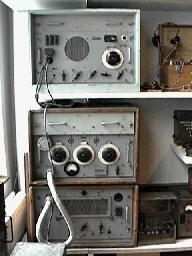 |
Back to index
Wireless Set 37
| Year of issue |
1941 |
|
| Purpose |
Short range parachute troops set |
|
| Frequency |
340-385 MHz |
|
| Range (miles) |
R/T 0.6 |
|
| Power output (watt) |
R/T 0.5 |
|
| Transport |
Man-pack |
|
| Remarks |
Abandoned |
|
Back to index
Wireless Set 38
The WS 38 is a man carried set designed for use by assault
troops and is a complete send/receive station with a range of
approximately 5 miles. It is carried in a web case designed to
fit alongside the respirator as worn in battle order. Weight of
the set with aerial case and satchel signals complete with
receivers and microphones is 24 lbs. approx. The WS 38
"hooks brace" enable the set to be fastened to the
soldier's webbing. On the Mk I a "bulb 2V W.F." is
fitted on the top of the wireless set to give indication of the
strength of the battery.
| Year of issue |
1941 |
| Purpose |
Infantry Coy Pl |
| Frequency |
7.3-9 MHz |
| Range (miles) |
R/T 0.5 |
| Power output (watt) |
R/T 0.2 |
| Transport |
Man-pack |
| Remarks |
|
Back to index
Wireless Set 38 AFV
| Year of issue |
1941 |
| Purpose |
Communication between Infantry and Tanks |
| Frequency |
7.3-9 MHz |
| Range (miles) |
R/T 0.5 |
| Power output (watt) |
R/T 0.2 |
| Transport |
AFV, Tanks |
| Remarks |
|
 Early AFV with control unit No12
|
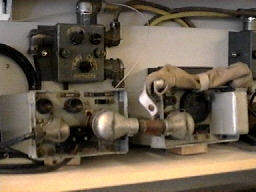 Later
version.
|
Back to index







